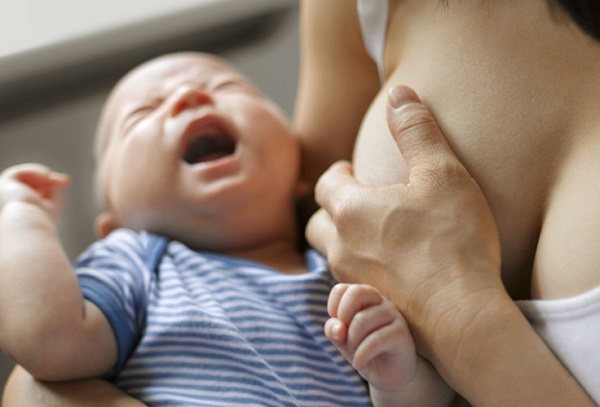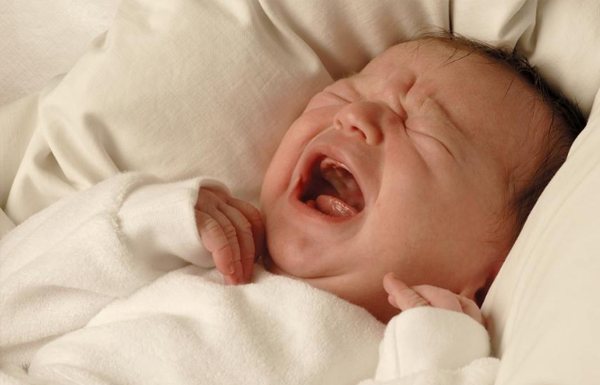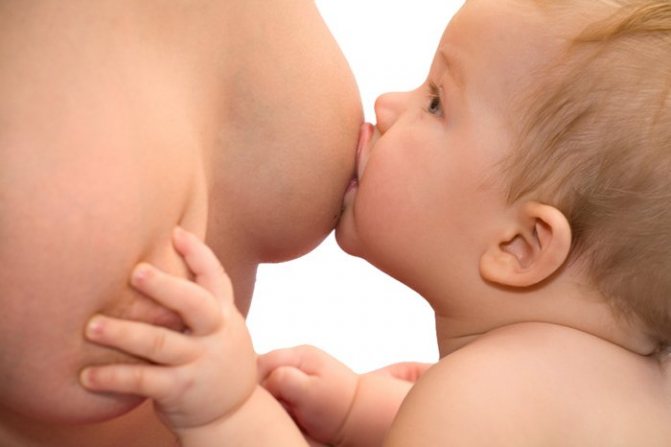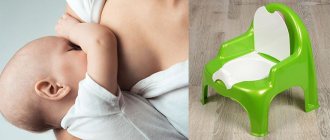Whims and crying are the only method by which a newborn baby can notify his parents of inconvenience, pain and discomfort. Crying and excessive physical activity in a baby can be provoked by intestinal colic, teething, emotional discomfort and other factors.
Often, young parents are faced with a situation where a newborn baby expresses anxiety when feeding, cries and knocks its legs. If the baby is breastfed, then the mother may think that the baby is not satisfied with the taste of milk. This factor plays a significant role, but is not the only one.
The main reason for crying during breastfeeding
As practice shows, several of the most common reasons for a child’s whims while feeding him breast milk are related to the physiology or behavior of the mother. These include:
- lack of breast milk;
- excess breast milk;
- uncomfortable position for the baby;
- breast structure.
Each of these cases is worth talking about in more detail.
Lack of breast milk
The baby may cry during feeding simply because he is not getting enough. This can happen for several reasons:
- the mother has poor lactation and little milk - as a rule, it normalizes over time. Well, at first, mom should regularly drink warm tea with milk or specially developed preparations and herbal mixtures;
- milk is difficult to suck out due to blockage of the passages in the breast - this usually occurs when wearing tight underwear;
- the baby is not at the breast long enough - in this case, the baby simply does not have time to get to the so-called. rear fractions of milk, saturated with fat. By the way, a child’s consumption of only the front fractions, rich in lactose, can cause excessive gas formation in him, which will ultimately also lead to crying.
It’s quite easy to track your baby’s lack of food by counting the number of bowel movements. On average, a little person urinates at least 6 times a day. In addition, it is worth watching for weight gain. After two weeks of life, babies gain an average of 150 g per week, i.e. 20-25 g per day. If the baby really does not have enough breast milk, then he should be supplemented with artificial formula.

Why does a baby cry while feeding?
As a rule, the reasons for a baby's tears at the breast or bottle with formula are physiological, and there may be several of them.
Tummy pain
Most likely, the child is bothered by colic (it can begin at 2–4 weeks of life and usually ends by 3 months). Unpleasant sensations are associated with the fact that the baby’s intestinal microflora is not sufficiently developed and it is difficult for the digestive system to cope with the task assigned to it. Baby crying during colic is accompanied by arching of the back and pressing of the legs towards the stomach - the pain from the formation of gases in the intestines is always acute. To alleviate the condition of the baby, it is useful for a nursing mother to drink teas with fennel, cumin or anise. If your baby is formula-fed, choose your formula carefully. Valio Baby baby food is as close as possible to the composition of breast milk and contains the prebiotic GOS, which is necessary for the health of the child’s digestive system. Colic can also be caused by improper feeding technique and, as a result, the baby catching excess air.
#PROMO_BLOCK#
Ear ache
Children under one year old often suffer from otitis media, this is due to the anatomical features of the structure of the nasopharynx in babies in the first months of life. A baby may cry during feeding because swallowing movements cause sharp pain in the ears. Very carefully touch the tragus of the baby's ears - if he cries, then you need to see a doctor.
Headache
It is no secret that many neurological disorders are accompanied by headaches. It becomes especially strong when swallowing. If your child constantly cries during feeding, be sure to make an appointment with a pediatric neurologist.
Inflammation of the oral mucosa
Crying during feeding may indicate that the baby is experiencing discomfort in the mouth or throat. Its cause is most often thrush or pharyngitis. These diseases require treatment under the supervision of a pediatrician.
Lack or excess of breast milk
The lactation of a nursing woman is influenced by a considerable number of factors - psychological state, fatigue, stress, poor nutrition and lack thereof, improper organization of breastfeeding. The baby may cry because he does not have enough milk. Whether food shortages are really critical can be easily verified using the wet diaper method. By the way, a baby’s crying may also indicate that there is too much milk - the flow is too strong and the baby simply choke.
Unusual taste of breast milk
If the mother ate, for example, something spicy the day before feeding, this will certainly affect the taste of the milk. The baby, of course, will cry. This cause of children’s “grief” is the most easily removable - be attentive to your menu and do not upset your beloved baby.
In addition to the reasons described, teething and gum inflammation, as well as nasal congestion due to allergies and acute respiratory viral infections, can cause children to cry when feeding. Be attentive to your baby. If everything is fine, the baby should not cry during feeding.
4 9
Nutrition
66143
0
Excess breast milk
The opposite situation, i.e. Excess milk can also cause the baby to cry during feeding. The reason is that the little person simply choke on the nutrient. The problem can be eliminated by preliminary pumping. Another way is to stop the feeding process and squeeze the breast firmly for about a minute. This will significantly reduce the flow of milk for a while, and the hungry baby will eat calmly.

Uncomfortable position for a baby
During feeding, the baby must be held correctly. If he is uncomfortable, this will also cause discomfort and screams. Experts advise doing the following:
- both baby and mother should take the most comfortable position. The mother is recommended to lie down, place the baby next to her on her side or lightly press her to herself;
- the baby's head should be higher than the butt, and the neck should not be curved;
- You shouldn’t press the head to your chest, but if necessary, you can control its rotation;
- It is desirable that the baby has maximum contact with his mother. Some pediatricians even recommend freeing the child from clothes for this purpose.
The correct position and close contact help calm the little man, and as a result, allow him to get enough of it normally.

The baby cries during feeding, what should I do?
In order to decide on the course of action if a baby cries during feeding, you must first understand the reasons for what is happening. There are a great many reasons for this behavior; in order to prevent their occurrence, the process of feeding the child should be properly organized.
How to feed a baby correctly
Proper feeding of a child involves placing the baby and mother in the most comfortable position for them. Recommendations for doing this could be:
- the baby and his mother should be placed in the most comfortable position for both, for which it is recommended to lie on a sofa or soft bed, hold the child on his side, or press him to the body;
- the baby’s head should be in a position slightly above his butt, and his neck should not be bent;
- You should not forcefully press the baby’s head to the chest, you should only indicate the direction in which the baby’s head is turning;
- Maximum contact between the bodies of the nursing mother and the baby should be ensured; it is better to free the baby from clothing if possible.
If the process of feeding a child is organized correctly, he will always eat well, which will have a positive effect on his development, growth and health.
Breast structure
New mothers often experience swelling in their breasts in the first few weeks after giving birth. As a result, it becomes uncomfortable for the baby to grab it. The problem is solved by pumping and/or applying cold compresses to the breast. This will reduce discomfort and swelling. However, it is worth remembering that you should not express too much milk. This can lead to increased lactation and even greater breast swelling.
The structure of the young mother’s nipples may cause some discomfort to the baby. This occurs if the nipple is depressed or flat. At first glance, this situation seems to be a serious problem. Actually the problem is not that big. You can always buy special pads for lactation in pharmacies, or you can simply use a breast pump before feeding. This procedure will slightly stretch the nipple, which will greatly simplify the task for the baby.

Causes
Without knowing the true reason for the child’s whims, many mothers make mistakes when trying to resolve this issue. If the child is fed with mother's milk, then some women make attempts to transfer the baby to artificial milk formula, which is highly not recommended without good reason.
In order for the problem to be resolved in a timely manner and in favor of the child, parents need to become familiar with the main reasons for the baby’s crying and whims during feeding. These reasons include:
- Intestinal colic. When excessive gas formation occurs in the baby's intestines, this process is accompanied by abdominal pain and discomfort. The cause of flatulence is the immaturity of the infant's digestive tract, when a small amount of digestive enzymes is produced. With intestinal colic, a newborn baby squirms when feeding, cries, knocks his legs and presses them to his tummy.
- Air bubble in the stomach. If the technique of attaching the baby to the breast is not followed, air enters the baby’s stomach along with the mother’s milk. When air accumulates in the stomach, a large bubble forms, which interferes with normal digestion.
- Violation of the diet of a nursing woman. If a young mother made mistakes in nutrition and consumed foods such as spices, garlic, onions and smoked meats, this will affect the taste of breast milk. The baby expresses his dissatisfaction by refusing to feed and crying.
- Insufficient lactation. When a newborn baby squirms and cries during feeding, the young mother is advised to pay attention to the sufficiency of the baby’s nutrition. With reduced lactation, the newborn stops eating.
- Hyperlactation. Another common cause of these symptoms is excessive breast milk production. When the mammary glands become full, the pressure of milk in their ducts increases, as a result of which the baby does not have time to swallow food normally.

The secondary causes of anxiety and crying of a baby during feeding are:
- An inflammatory process in the oral cavity of a child caused by a bacterial and fungal infection (thrush).
- Inflammation of the middle ear (otitis). This disease is common among children under one year of age. If the baby expresses strong dissatisfaction during feeding, screams and cries, then parents are advised to show the child to an otolaryngologist.
- Teething. When a baby begins to cut his first teeth, this process is accompanied by pain, itching and discomfort. Increased pain during feeding causes whims.
- Neurological disorders accompanied by headache. Swallowing movements during feeding provoke increased headaches, causing the baby to cry and squirm.
- Respiratory infection and allergic reactions leading to nasal congestion. If there is no nasal breathing, the baby cannot eat.
Other reasons for a baby crying while breastfeeding
Of course, the reasons for a baby’s crying during feeding may not only be the mother’s breasts. It is quite possible that the matter is in the imperfect digestive system of the smallest person or in the processes taking place in the baby’s body.
You should start with colic and sharp pain in the baby’s tummy. Usually these phenomena are observed during the first months of a person’s life. The digestive system does not yet fully cope with its functions, which leads to excess gas formation. This is what causes discomfort. A light circular tummy massage, dill water, or medications that help reduce the amount of gas in the body can help relieve your baby of colic. True, drug treatment should be resorted to only after consultation with a local doctor.
In older babies, the cause of crying during feeding may be teeth emerging in the mouth. Swollen gums prevent the baby from sucking the breast, causing a lot of unpleasant sensations and, as a result, crying. Special gels will help make your baby's life easier. Well, parents just need to get through this period.
External stimuli can also cause a baby to cry during feeding: bright light, loud sounds, stuffiness in the room. All these unpleasant factors are easy to track and, if possible, try to eliminate.
Well, if you cannot independently determine the reason for the baby’s crying, then you must definitely show the baby to the doctor. Perhaps the problem lies in some congenital or acquired disease. And only a specialist can make the correct diagnosis and then prescribe treatment.











